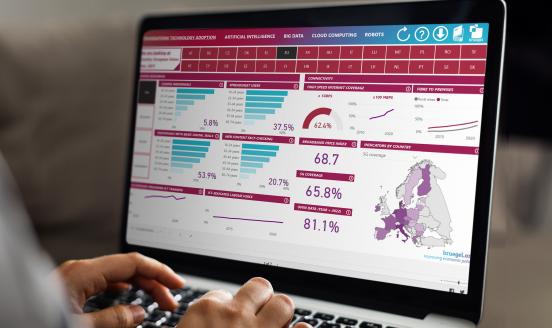Technology adoption dashboard

To download the underlying data from this dashboard and the explanatory methodological note, please click the download button on the top left of the screen. For any questions, please email [email protected].
As the use of technology becomes increasingly prevalent in EU economies, one question arises: Is the adoption of technology evenly distributed among EU member states, or are there some that are falling behind?
This dashboard aims to address questions relating to various aspects of technology adoption in the EU member states by offering valuable insights into the adoption of four key digital technologies. The dashboard has five sections: the main page displays the foundations of technology adoption, while the remaining pages provide valuable statistics on adoption of artificial intelligence (AI), big data applications, cloud computing and implementation of robots.
The dashboard does not just provide the current state of technology adoption among EU member states; it also identifies the main barriers hindering further adoption. Moreover, the dashboard does not solely provide country level data, it also allows the user to focus in to sector-specific information. Using multiple filters, the users can easily customise the data and the underlying data is available for download.
This dashboard enables the users to gain an understanding of the extent of technology adoption in Europe. The foundations page delves into the digital skills pool and sheds light on how the level of digital skills differs across socioeconomic groups. Moreover, it also provides information on the technological infrastructure such as high-speed internet, fiber and 5G. What purposes do AI technologies serve? Where does the bulk of big data originate? What are the main barriers hindering cloud computing? Which industries heavily rely on the implementation of robots? are other examples of the information offered by Bruegel's technology adoption dashboard.
This dashboard is part of the Future of Work and Inclusive Growth in Europe project at Bruegel, which aims to develop multiple dashboards on labour market topics. It has been produced with the financial support of the Mastercard Center for Inclusive Growth.
To access the dashboard on the external website, please click here.



